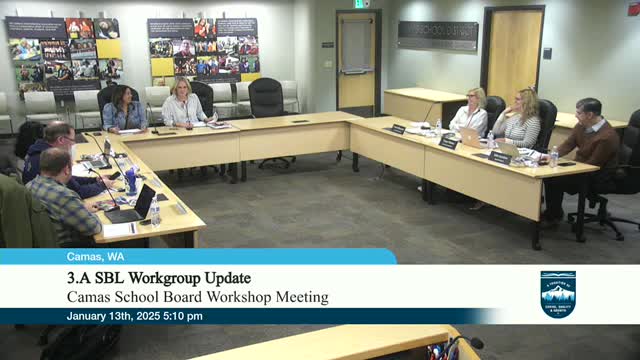Camas School District work group advances standards-based learning; seeks consistency and clearer family communication
Get AI-powered insights, summaries, and transcripts
Subscribe
Summary
At a Jan. 13 workshop the district’s Standards-Based Learning work group reported progress on common scales, reassessment guidelines and professional learning, while flagging inconsistent practice across buildings, communication gaps with families, and the need for more district-level guidance.
The Camas School District gave the board a progress update on its Standards-Based Learning (SBL) initiative at the Jan. 13 workshop, reporting steps toward common grading scales, reassessment guidelines, professional learning and an emphasis on clearer communication with families.
Katie, co-lead of the SBL work group, said the initiative is intended to improve consistency and equity across the district by aligning instructional expectations, assessments and reporting practices. "One of the biggest reasons for really focusing on standards based learning is because we know that this has an equity focus," Katie said, noting longstanding gaps for student groups the district described as historically marginalized.
The SBL guiding team counts 27 members plus two co-leads, Katie and Sherry, and typically draws 20–25 participants to monthly evening meetings, staff reported. Among the accomplishments cited: adoption of a common four-point proficiency scale at the middle- and elementary-school levels (with .5 increments such as 2.5 and 3.5), revised middle-school grading periods to close grades at semester instead of leaving year‑long open gradebooks, and draft reassessment guidelines developed with teacher and student focus‑group input.
Staff described several professional-learning activities, including workshops on student-growth assessment and the Marzano instructional framework and district sessions showing how AI tools might assist in developing standards-aligned scales. Joy Garner, the district’s instructional equity coach, relayed teacher feedback gathered from middle-school teachers that the shifts in practice are helping some educators better identify what students know and don’t know.
The work group also produced a glossary and guidance about how standards and scales are represented in the district’s learning management system (referred to in the meeting as Cumulative). Staff said they are working to create a public district webpage with frequently asked questions to explain grading and reporting changes for families.
Challenges remain. Work-group leaders listed inconsistency across schools and grade levels, resistance to change among families and some staff, difficulty gathering valid, representative feedback, time and professional-development constraints, and technological limits in their reporting tools. Staff said the Washington State learning standards revision (OSPI) was expected to publish a draft in December 2024 but had not yet been released, complicating alignment work.
Board members raised concerns about family understanding of new reporting formats and potential impacts on college admissions. Staff clarified that reporting formats such as letter grades or percentages are implementation choices and that some district programs (for example, Discovery High School) already use four-point scales that translate to traditional report-card grades.
Next steps for the work group include a month-by-month scope for the rest of the school year (curriculum and instruction focus in February), expanded professional learning sessions, creation of a public FAQ on the district website, district‑level guidance to reduce disparities across buildings, and a final work-group review in May. Staff said the intent is to use existing leadership and MTSS structures to cascade guidance from district to school level.
The co-leads asked the board for feedback on the progress-report format and for continued questions and support as the group collects staff, student and family input.
